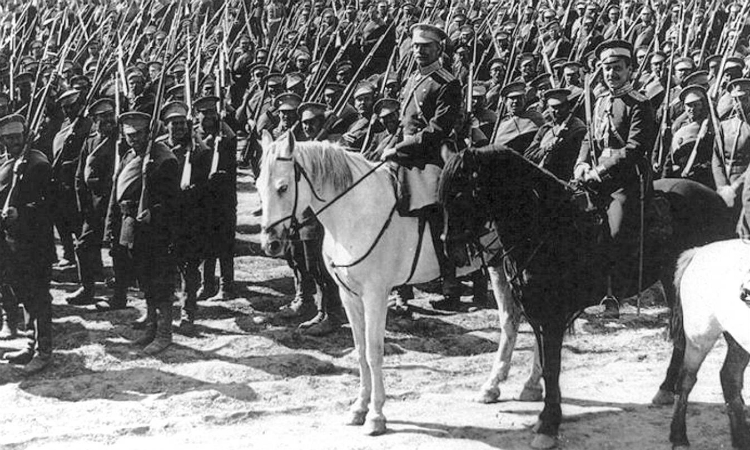Rethinking the “Lessons” of the First World War
History can be a good friend of confirmation bias. We often look to the past for lessons that support beliefs that we already have instead of the ones best supported by a deep analysis of the evidence.

History can be a good friend of confirmation bias. We often look to the past for lessons that support beliefs that we already have instead of the ones best supported by a deep analysis of the evidence. For most of today’s pundits and those academics who use the past to imagine the future, the origins of the First World War generally present one of two sets of “lessons.” The first, taking its cue from a recent best seller, characterizes the leaders of that age as “sleepwalkers” who were unusually incompetent and out of their depth. A second set of lessons argues that a presumed similarity between our times and the years prior to 1914 makes conflict today more likely, or even inevitable. These “lessons” need nuance and historical context if they are to provide any insights for today’s policymakers.
We’d like to believe that the First World War began because of the mistakes of a singularly incompetent generation or over some long-buried dispute like Alsace-Lorraine. If that were true, then there would be nothing for us to learn from that catastrophe. But, as I have argued elsewhere, the real lessons of 1914 for strategists and politicians today are far more disconcerting and terrifying because that year’s perfect storm of alliance obligations, public messaging, outdated strategic assumptions, and misperceptions could well repeat. The war that results, moreover, may be quite different from the one that military and political leaders imagine.
Historical analogies are tempting and provide an easy heuristic for processing information, but they can also be quite dangerous. The world of 1914 does indeed bear many similarities to 2018, but, as always, the parallel is far from exact. As that fateful summer began, few people expected great power conflict. Long, drawn-out crises in Morocco, Sudan, and the Balkans had recently come and gone with little impact on the peoples of Europe. The literature of the day featured numerous books predicting an end to major wars; experts perceived them as being too expensive, too unproductive even for the winners, or no longer a tool that so-called civilized nations used to pursue state interests.
If there were to be a crisis, most Europeans expected it to come either on the Rhine River between Germany and France, or in the North Sea between the British and German fleets. But the French and Germans had resumed normal, even productive, relations after the 1911 Morocco crisis, and the Germans had largely ended their attempt to challenge the Royal Navy. In late June 1914, when Archduke Franz Ferdinand and his wife arrived in Sarajevo, sailors from the two fleets were getting drunk together at Fleet Week in Kiel. Winston Churchill, who was there, later observed that no one in Kiel could have imagined that they would be at war within a few short weeks.
The shooting of an obscure archduke ought not to have changed this placid picture; indeed, for most Europeans, it did not. Within a few days, the story of a supposedly deranged teenager’s act in a faraway city had largely disappeared from the front pages of newspapers in London, Paris, Berlin, and even Vienna. When European newspapers did discuss their fears of an impending war, they most commonly referred to the possibility of civil war in Ireland after the passage of a controversial Home Rule act in Parliament. If anything were to come out of the latest crisis in the Balkans, it would involve Austria-Hungary and Serbia only, and even then only if the Austrians could prove their allegations that Serbian officials had been behind the plot.
But the Austrian higher leadership read something different into the assassination. They believed that Franz Ferdinand’s assassination amounted to what we would today call state-sponsored terrorism. In their eyes, this meant that Austria found itself in a strangely advantageous strategic situation. All European governments and most European peoples sympathized with the murdered archduke and his wife. If Europeans knew anything about the couple, they knew that Franz Ferdinand had married the woman he loved, despite the fact that she was not a Habsburg. As a result, they had made a modern marriage for love instead of power, even though the emperor’s disapproval led them to be snubbed at court and their children excluded from the line of succession.
To the senior leaders of the empire, the sympathy pouring into Vienna meant that, for the first time in decades, Austria-Hungary appeared as an aggrieved party in a Balkan crisis. They therefore believed that European public opinion would permit them to push matters with Serbia a bit further than they had been able to do during past crises. Moreover, the absolutist regime in Russia might hesitate to support a state that backed regicide, even if the Russians publicly posed as Serbia’s nominal protector. Britain, meanwhile, was distracted by events in Ireland, and the French were enraptured by the final days of the trial of Henriette Caillaux, the wife of a prominent politician who had shot a newspaper editor. (Her lawyer claimed, for the first time in French legal history, that she was not guilty by reason of mental defect because, her husband having refused to challenge the editor to a duel, her female brain could not adjust to playing the male role of having to defend the family’s honor.) In any case, both Britain and France had shown themselves reluctant to get directly involved in past Balkan crises. Austria-Hungary’s leaders had every reason to believe that officials in London and Paris would move slowly during this one.
For senior Austro-Hungarian officials, the military situation created by the assassination was almost ideal. They guessed that no regime in Europe would jump to Serbia’s defense, not even Russia. The British, French, and Italians would likely stay neutral or, in any event, not intervene while Austro-Hungarian forces moved south. If those forces moved quickly and crushed the Serbians, they might present Europe with a fait accompli before the great powers could stop them.
Their German allies read the situation in much the same way. Senior military leaders in Berlin worried about Russian military and industrial growth. Within a few years that growth would render most German military planning obsolete, confronting the Germans with a two-front war that most assumed they could not win. Although only a few people knew it, the German war plan tried to get out of that dilemma by sending seven of its eight field armies against France no matter what diplomatic crisis triggered war. In this particular one, therefore, France might be caught sleeping, Britain might declare neutrality, and, for once, the Austrian ally in whom they had so little faith might have a motivation to fight well. The stars would likely never line up so favorably again.
Thus did Germany issue a “blank check” of support to Austria. If, as expected, Russia remained neutral, then Austria could inflict a devastating blow onto Serbia and Germany would gain by association without having to do anything. If Russia mobilized, then Germany could enact its war plan under extremely favorable circumstances, most notably by quickly attacking a distracted France, most of whose people saw no link whatsoever between themselves and an assassination in Sarajevo. Perhaps most crucially, the German regime could defend its efforts to the German people as a purely defensive response to Russian provocation.
Having drawn these conclusions, the Austro-Hungarians delivered their now infamous ultimatum to Serbia on July 23. It gave Serbia just 48 hours to reply, meaning that the long, slow diplomacy that had taken months to resolve and defuse recent crises in Morocco and Sudan had no time to work. Serbia tried to be conciliatory, but the Austrians, with German backing, wanted war on terms that they assumed were as favorable to them as they could ever hope to get.
Europe was stunned by the ultimatum, not the assassination; for this reason we call the crisis leading to war the July Crisis, not the June Crisis. Soldiers, including many senior leaders on leave in countries soon to be their enemies, hurried home to their units. Statesmen canceled vacations, and many foresaw that Europe was about to go to war over an issue that did not actually affect the vital interests of any of them except Austria-Hungary. They did not so much sleepwalk as awaken from a deep and pleasant slumber by a terrible fire that they could neither extinguish nor escape.
This is why the war that began in 1914 became the First World War instead of the Third Balkan War. The crisis hit too quickly and did not conform to the intellectual idea Europeans had of future war. It had not begun over a German-French confrontation as expected, yet the Germans were sending hundreds of thousands of soldiers to invade France and neutral Belgium. Perhaps more importantly, because Russia had mobilized first, every nation in Europe could defend its actions as essentially defensive in nature, and therefore just.
Europe, and by extension much of the world, was now at war for reasons no one could quite explain, except to say that they were fighting to protect themselves from an enemy immoral and inhuman enough to break the peace. Thus even socialists and most pacifists initially supported what they saw as a just war. Within a few dizzingly short weeks, the initial premise of Austria-Hungary’s demands on Serbia had fallen aside and the war had become a total war, fought for national survival and the complete destruction of the enemy. Unlike many past wars, there were no limited war aims to compromise over or to stop the fighting once attained. Thus were future mediation efforts by the Vatican, the Socialist International, and U.S. President Woodrow Wilson doomed to fail.
The causes of the First World War do not belong to a dead past of ancient ethnic grievances or governments ruled by incompetent aristocrats. Instead, the war began because of fatal miscalculations and unexpected contingencies. Put bluntly, strategists had planned for one set of crises, but got another. Their world, much like our own, had changed far too quickly for their plans or their intellectual preconceptions to adjust. In effect, they fought the wrong war, but all of the great powers could plausibly claim (at least in August 1914) that they had fought for the right reason, self-defense.
The lesson, therefore, is to underscore the need for constant reevaluation of assumptions through critical thinking. In our time, rapid change in the international and domestic order might mean that crises do not conform to the intellectual preconceptions of the strategists. Without critical thinking, especially about the so-called lessons of history, leaders may not be supple enough to adjust their thinking in time to avert war. And, as in 1914, once begun, wars often continue until nations and empires lie in ruins without anyone able to explain why.





